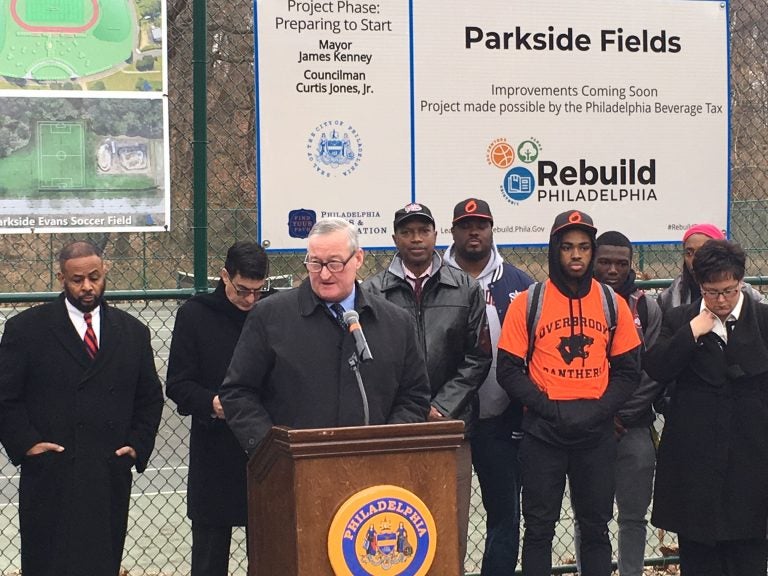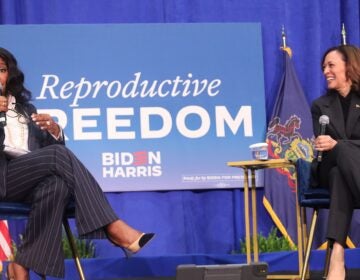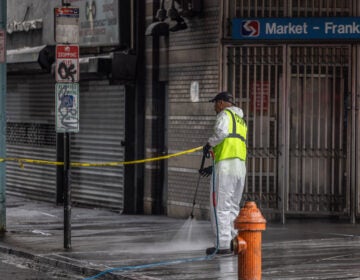Kenney’s ambitious Rebuild project offers Philly chance to increase minority participation in city’s future
Rebuild initiative gives Philadelphia opening to do business with more minority- and women-owned firms. That’s been a city goal for decades.

Mayor Jim Kenney at the first groundbreaking of his signature Rebuild initiative. (Malcolm Burnley/PlanPhilly)
Philadelphia Mayor Jim Kenney gathered members of City Council and small-business people Monday to tout his $500 million Rebuild program as a means of equitable economic development.
Philadelphia — a majority-minority city — has struggled with increasing the proportion of minority-owned firms that do business with the city.
African American leaders in the city have pushed for greater minority participation for years. Now, the Kenney administration argues that two programs launched Monday will ensure that the Rebuild program can make a meaningful contribution to this longtime goal.
There’s been a “lack of opportunities for small businesses, lack of access to capital, no support from city government going back decades,” said Jihad Ali, manager of the Rebuild project at the Enterprise Center in West Philadelphia, where Kenney unveiled his administration’s new policies. “This has been years in the making.”
A program called “Rebuild Ready” will provide administrative and technical support to small minority- and women-owned businesses to ensure they can get work on Rebuild projects, which will include the renovation of parks, libraries, and recreation centers across the city.
Historically, many small businesses have had a difficult time securing city work because they face challenges in securing loans from financial institutions and in meeting the city’s insurance and bonding requirements. Reimbursements and other payments also can take longer to work through various municipal approval processes, and the wait can be a burden.
Rebuild Ready does not offer loans itself, but the program will connect small businesses with the Enterprise Center and Surety Bond Associates to ensure they can get the financing necessary to secure and complete city contracts.
The Emerging Vendors Program, meanwhile, will allow small businesses to be counted toward Rebuild’s diversity goals while they are in the process of certification as a minority- or women- owned business. Now companies can only secure work after they have completed certification, so the Emerging Vendors program will expedite the process.
The project overall has a goal of 30- to 35% minority-owned business participation and 25- to 30% for professional services contracts. For women-owned businesses those numbers are both 15- to 20%. Rebuild representatives say they have met or exceeded these goals so far.
“The most successful Rebuild project won’t just be the one that results in a revitalized community space, it will be the renovation of a rec center that provided a small minority contractor with their largest contract to date,” said Kenney. “Or a new playground that presented a woman-owned business with their first opportunity to work on a city project.”
Both Councilman Derek Green, who has been pushing for Rebuild to include increased support for minority-owned small businesses for years, and Councilwoman Jannie Blackwell spoke with Kenney at Monday’s press conference.
Blackwell linked the new policies back to work by her husband, Lucien Blackwell, who held her Council seat before she did. She described the Kenney administration’s fresh commitments around Rebuild as a logical extension of her late husband’s work, citing the law he fought for in the early 1980s that set a goal of awarding 15% of all city contracts to minority-owned businesses and 10% women-owned businesses.
“It’s taken us a long time to come here, but we’ve been around a long time, the mayor has heard these issues, and I think Rebuild is a very great example of what can come,” said Blackwell. “We are looking forward to all it will be for history, for posterity, for people to see what can happen when we want to make a difference.”
Philadelphia and many other American cities have struggled to meet their minority participation goals, in part, because many minority- and women-owned businesses tend to be smaller and can have a harder time meeting other benchmarks set by the city. As a result, larger and more established firms often have an easier time winning contracts.
In the tragic aftermath of the city’s bombing of the MOVE compound in 1985, Mayor Wilson Goode attempted to ensure the firm contracted to rebuild the neighborhood was black owned. But the firm he chose ended up badly bungling the project, and the city ended up offering to buy out residents from their defective and leaky new homes.
“I think in 1985 we selected probably the best African American contractor in business in Philadelphia,” Goode told PlanPhilly in 2016. “Throughout the history of Philadelphia, it’s been very difficult to find major contractors who can compete for major contracts of that size. That has changed over the years. But that type of quality African American contractors did not exist back in 1985.”
These days, as more minority- and women-owned firms have grown and developed,
there are more options. Currently, the block scarred by the MOVE bombing is being redeveloped successfully by an African American owned firm.
The Kenney administration wants to ensure that the mayor’s signature Rebuild initiative can provide an entry point to future work. The city’s commerce director, Harold Epps, said that Rebuild is just the beginning. Billions more will soon be invested in Philadelphia International Airport, the Navy Yard, and Schuylkill Yards.
“Within five miles of here over the next 10 years, we will spend $5 billion at least,” said Epps. “If you trust the process, you will come out the other end with a shot to do business in that $5 billion arena. If you don’t, you got no shot.”
WHYY is your source for fact-based, in-depth journalism and information. As a nonprofit organization, we rely on financial support from readers like you. Please give today.







